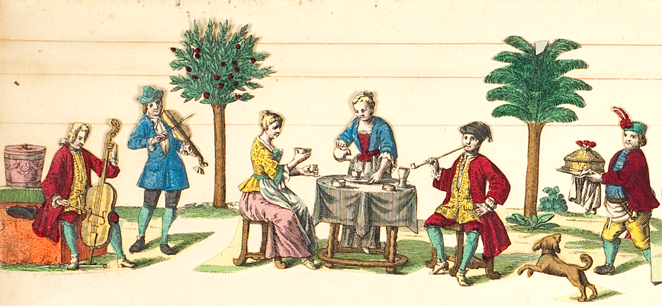Collection context
Summary
- Creator:
- Orwell, George, 1903-1950
- Abstract:
- The Blair, E. mss., 1935-1945, consists of letters of novelist Eric Arthur Blair, 1903-1950, better known by the pseudonym "George Orwell," to his literary agent, Leonard Parker Moore, 1876-1959.
- Extent:
- 1 folio
- Language:
- English .
- Preferred citation:
[Item], Blair, E. mss., Lilly Library, Indiana University, Bloomington, Indiana.
Background
- Biographical / Historical:
Eric Arthur Blair, better known under the pseudonym George Orwell, was born on June 25, 1903, in Motihari, Bengal, India, where his father worked as an opium agent for the Bengalese government under the British Raj. When Blair was three years old, his mother brought him and his siblings to England to receive an education at England's best schools. His family had an English aristocratic background but by Eric Blair's generation, their wealth had run dry, and so he relied on scholarships and the generosity of his maternal uncle to support his education. At a young age, Blair showed great intellectual aptitude and won a scholarship to attend Eton, but his stubborn resistance of authority and neglect of assigned tasks prevented him from attending university. Instead, he took the Indian Civil Service exams and joined the Burma police in 1921. While in Burma, he was not popular among his police colleagues and grew to resent British colonial rule and its effects on the Burmese people. In 1927, he resigned from his position to become a writer and live among the poor in England. A year later, he moved to Paris to write and, failing to find a publisher for his work, lived in poverty. His personal experiences inspired the first book he published, Down and Out in Paris and London (1933). His first novel, Burmese Days (1934), was so obviously based on his days as a discontented policeman in Burma that the work had to be published in the United States for fear of libel suits in England.
Over the next few years, Blair struggled to succeed professionally as a author and began to equate literary success with selling out. His big break came when in January 1936, Victor Gollancz gave him a large advance payment to write a book about poverty and unemployment, which resulted in his controversial The Road to Wigan Pier (1937) on working-class life in northern England. In June 1936, Blair married University College, London educational psychology student Eileen Maud O'Shaughnessy, 1905-1945. Though Blair was critical of political parties, the outbreak of the Spanish Civil War aroused Blair's anti-fascist passion, and shortly after completing The Road to Wigan Pier in December 1938, he joined the independent Partido Obrero de Unificacion Marxista (POUM) militia to fight the Francoists, but found hostility from the Communists as well, which turned him ideologically against communism. In June 1937, Eileen helped a wounded Blair to escape Spain and return to England. Gollancz refused to publish Blair's subsequent indictment of the Communists for endangering the Spanish socialist cause in Homage to Catalonia, so the Trotskyite publisher Frederick Warburg published it in 1938. In the same year, Blair was diagnosed with tuberculosis and spent some time in a sanatorium and Morocco for recovery. He tried to join the army in World War II, but was rejected on account of his disease, and instead joined the Home Guard and worked as a BBC producer. During the war, he gained success as a political and literary essayist. In 1944, Blair tried to publish his seminal Animal Farm, but many publishers, including Gollancz, refused to put it out while Russia was still an ally. Shortly after the war, Harcourt Brace published the book with massive success. After the death of his wife, Blair wrote Nineteen Eighty-Four (1949) in seclusion and dying of tuberculosis on the island of Jura. At age 46, the writer succumbed to the disease in a London hospital on January 21, 1950.
- Scope and Content:
The Blair, E. mss., 1935-1945, consists of letters of Eric Arthur Blair, 1903-1950, novelist, known under the pseudonym of George Orwell, to his literary agent, Leonard Parker Moore, 1876-1959. They deal with the publication of Blair's writings, including books, contributions to periodicals, book reviews, and dramatic criticisms; his contracts with Victor Gollancz, Ltd., and other publishers; reprints of his books; translations of his works into French, Polish, and other languages; lecture engagements; broadcasting; reviews of his books; the progress of current writing; plans for future writings; his participation in 1937 in the Spanish Civil War; his finances; his health; and other personal matters.
A few of the letters, 1937-1938, are written by Blair's wife, Eileen Maud (O'Shaughnessy) Blair, 1905-1945, who took care of her husband's business affairs while he was fighting in Spain in 1937 and during his illness in 1938.
- Acquisition information:
- Acquired: 1959, 1960
- Arrangement:
This collection is arranged following original order.
- Physical location:
- Lilly - Folio
Indexed Terms
Access
- RESTRICTIONS:
-
This collection is open for research.
Many collections are housed offsite; retrieval requires advance notice. Please make an appointment a minimum of one week in advance of your visit.
- TERMS OF ACCESS:
-
Photography and digitization may be restricted for some collections. Copyright restrictions may apply. Before publishing, researchers are responsible for securing permission from all applicable rights holders, then filling out the Permission to Publish form.
- PREFERRED CITATION:
-
[Item], Blair, E. mss., Lilly Library, Indiana University, Bloomington, Indiana.
- CAMPUS:
- Indiana University Bloomington
- LOCATION OF THIS COLLECTION:
-
1200 East Seventh StreetBloomington, Indiana 47405-5500, USA
- CAMPUS:
- Indiana University Bloomington
- CONTACT:
-
(812) 855-2452liblilly@indiana.edu

